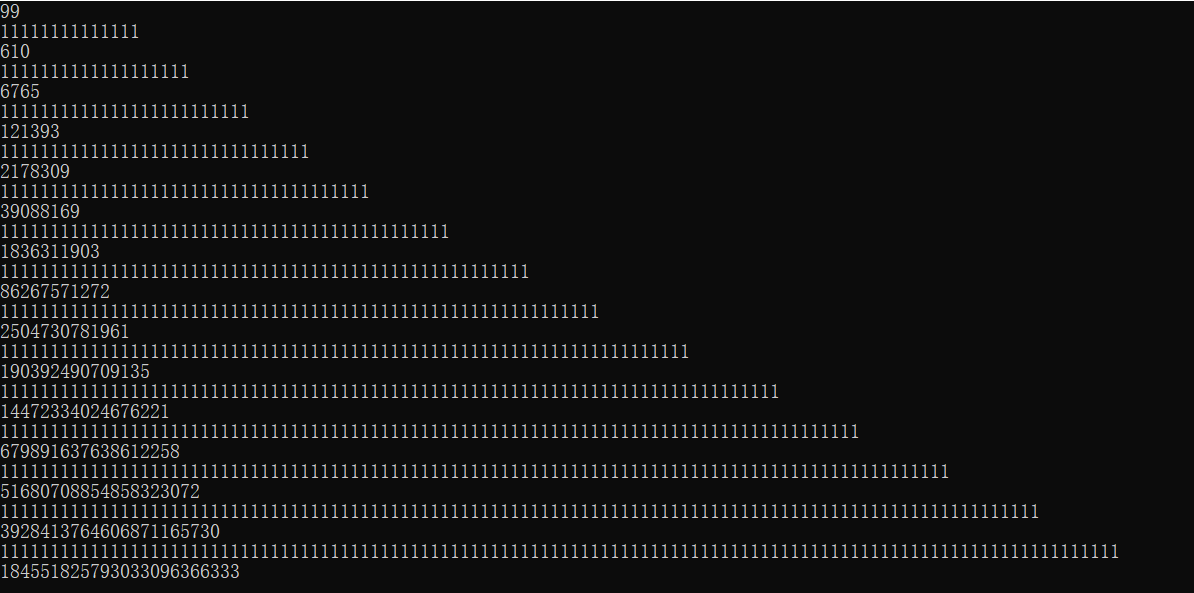hdu1865 1sting (递归+大数加法)
1sting
Time Limit: 5000/1000 MS (Java/Others) Memory Limit: 32768/32768 K (Java/Others)
Total Submission(s): 6878 Accepted Submission(s): 2678
Problem Description
You will be given a string which only contains ‘1’; You can merge two adjacent ‘1’ to be ‘2’, or leave the ‘1’ there. Surly, you may get many different results. For example, given 1111 , you can get 1111, 121, 112,211,22. Now, your work is to find the total number of result you can get.
Input
The first line is a number n refers to the number of test cases. Then n lines follows, each line has a string made up of ‘1’ . The maximum length of the sequence is 200.
Output
The output contain n lines, each line output the number of result you can get .
Sample Input
3
1
11
11111
Sample Output
1
2
8
输出的结果巨长,远超出一般的数据范围^v^

#include<iostream> #include<stdio.h> #include<string.h> using namespace std; int a[1010][1010];//因为是大数,一维数组并不能储存数字,所以用二维,后面用来分别储存大数的每个位数 int main() { int n,t; int r,s,i; r=0; memset(a,0,sizeof(a)); a[1][1]=1; a[2][1]=2; for(i=1;i<=997;i++)//大数的加法 { for(int j=1;j<=1010;j++)//底位在数组前面,高位存在数组后面 { s=a[i][j]+a[i+1][j]+r; a[i+2][j]=s%10; r=s/10; } } scanf("%d",&t); while(t--) { char str[201]; cin>>str; n=strlen(str); if(n==1) printf("1\n"); else if(n==2) printf("2\n"); else { for(i=1010;i>=1;i--)//从高位开始输出 if(a[n][i]) break; //当a[n][i]为0时跳出,此时的i即答案有几位数,进入下一步的输出 for(;i>=1;i--) printf("%d",a[n][i]); printf("\n"); } } return 0; }
相同的题目:hdu5686
Problem B
Time Limit: 2000/1000 MS (Java/Others) Memory Limit: 65536/65536 K (Java/Others)
Total Submission(s): 1615 Accepted Submission(s): 665
Problem Description
度熊面前有一个全是由1构成的字符串,被称为全1序列。你可以合并任意相邻的两个1,从而形成一个新的序列。对于给定的一个全1序列,请计算根据以上方法,可以构成多少种不同的序列。
Input
这里包括多组测试数据,每组测试数据包含一个正整数N,代表全1序列的长度。
1≤N≤200
1≤N≤200
Output
对于每组测试数据,输出一个整数,代表由题目中所给定的全1序列所能形成的新序列的数量。
Sample Input
1
3
5
Sample Output
1
3
8
Hint
如果序列是:(111)。可以构造出如下三个新序列:(111), (21), (12)。#include<iostream> #include<stdio.h> #include<string.h> using namespace std; int a[1010][1010];//因为是大数,一维数组并不能储存数字,所以用二维,后面用来分别储存大数的每个位数 int main() { int n; int r,s,i; r=0; memset(a,0,sizeof(a)); a[1][1]=1; a[2][1]=2; for(i=1;i<=997;i++)//大数的加法 { for(int j=1;j<=1010;j++)//底位在数组前面,高位存在数组后面 { s=a[i][j]+a[i+1][j]+r; a[i+2][j]=s%10; r=s/10; } } while( cin>>n) { if(n==1) printf("1\n"); else if(n==2) printf("2\n"); else { for(i=1010;i>=1;i--)//从高位开始输出 if(a[n][i]) break; //当a[n][i]为0时跳出,此时的i即答案有几位数,进入下一步的输出 for(;i>=1;i--) printf("%d",a[n][i]); printf("\n"); } } return 0; }
等风起的那一天,我已准备好一切



